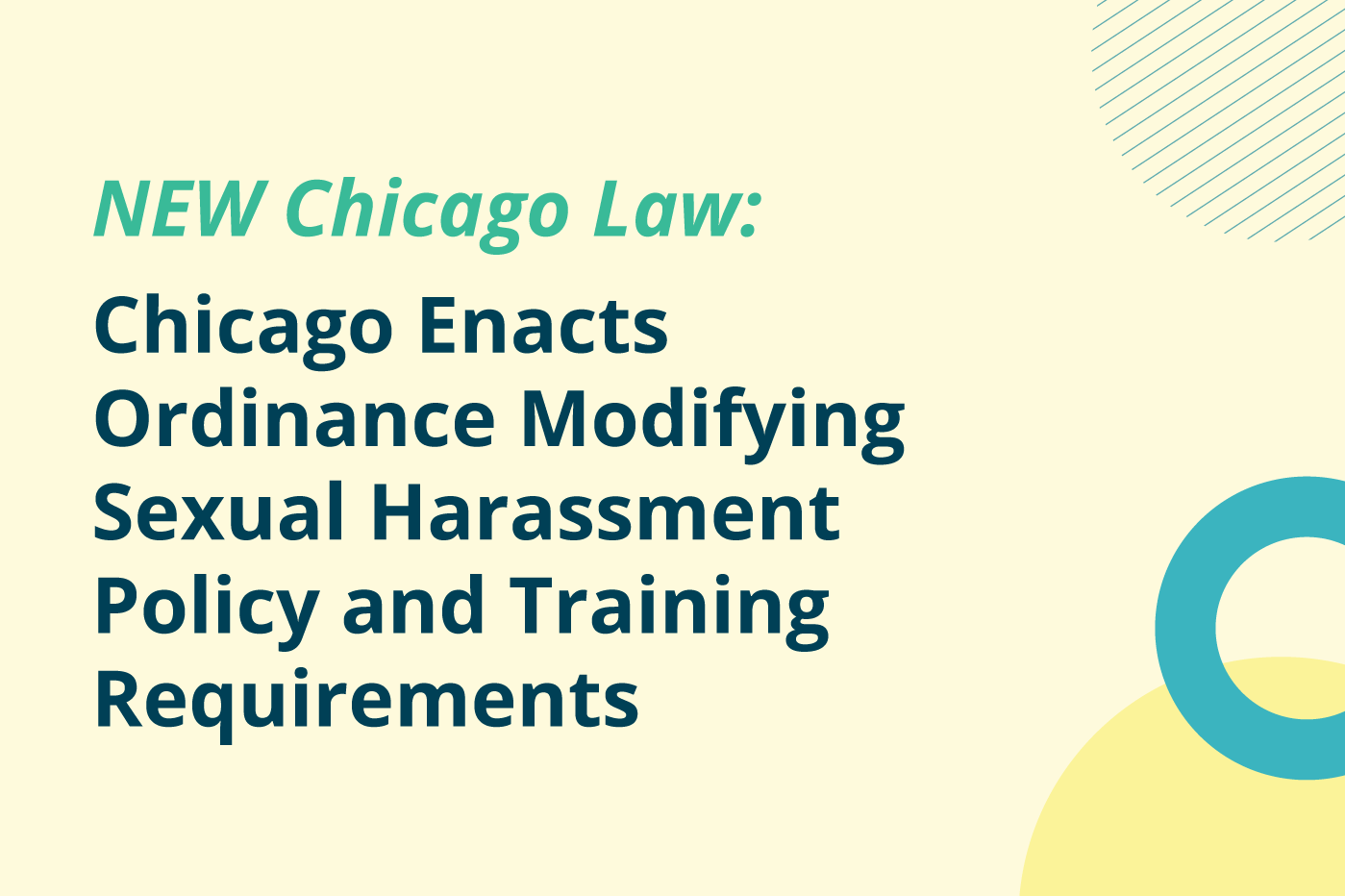Chicago Enacts Ordinance Modifying Sexual Harassment Policy and Training Requirements
Chicago has enacted a new sexual harassment prevention ordinance. This new law will increase obligations on employers of all sizes to provide one hour of sexual harassment prevention training and one additional hour of bystander training to all employees. Employers will need to provide two hours of sexual harassment prevention training to managers and supervisors (plus the required one hour of bystander training for a total of three hours of training). The ordinance, which applies to all employers licensed to do business in the City of Chicago (or with work locations in the City), goes into effect on July 1, 2022. This means employers must comply with the expanded training requirements by June 30, 2023.
Given the year of transition, we strongly recommend training your Chicago employees per the requirements of this new law at the beginning of 2023. For now, your 2022 Illinois harassment training is compliant with City law through the end of the year and into 2023. That said, you must have a plan to provide 60-minute employee training (and bystander training) and 120-minute manager and supervisor harassment training (and one-hour bystander training) in the first half of 2023. The Chicago Commission on Human Relations has published an information site that states that compliance with the Illinois State training mandate will be sufficient for non-supervisory employees (so long as the training meets the one-hour training requirement). The City has also clarified that a model two-hour bystander training will be released by July 1, 2022.
New Ordinance Impacts Employers in Several Important Ways
Among the changes to the Chicago municipal code (in addition to the harassment training requirements) are the following essential revisions to the City of Chicago harassment law:
- Enhanced Definition of Sexual Harassment
As of June 4, 2022, the Chicago definition of sexual harassment will include language on sexual misconduct. In sum, the new definition of the term under municipal law is:
“Sexual harassment” means any (i) unwelcome sexual advances or unwelcome conduct of a sexual nature; (ii) requests for sexual favors or conduct of a sexual nature when (1) submission to such conduct is made either explicitly or implicitly a term or condition of an individual’s employment; or (2) submission to or rejection of such conduct by an individual is used as the basis for any employment decision affecting the individual; or (3) such conduct has the purpose or effect of substantially interfering with an individual’s work performance or creating an intimidating, hostile, or offensive working environment; or (iii) sexual misconduct, which means any behavior of a sexual nature which also involves coercion, abuse of authority, or misuse of an individual’s employment position.
The definition will look familiar to those HR professionals used to training on the subject. Still, as noted above, subsection (3)(iii) expands the codified definition to include the commonly recognized form of physical harassment that extends into the assault and battery realm (to use criminal terms).
- Written Policy Requirement
Like many other states and municipalities, as of July 1, 2022, Chicago employers must have a written policy prohibiting sexual harassment. The policy requirement has many of the familiar elements to those with employees working elsewhere. Specifically, the written policy must contain:
- A statement that harassment is illegal in Chicago;
- The definition of harassment as stated above;
- The requirement that all employees participate in sexual harassment prevention training annually;
- The temporal requirements for required training (one hour for employees; two hours for managers);
- Examples of conduct that constitutes sexual harassment;
- Details on how an individual can report an allegation of sexual harassment (including confidential reports and how to report internally and to legal and governmental authorities;
- A statement that retaliation for making reports of harassment is illegal in Chicago.
Additionally, the written policy must be available in the employee’s primary language within the first week of employment. A poster advising on the prohibition of sexual harassment must be displayed where all employees can see it.
- More Stringent Monetary Penalties
The revisions to the law increase penalties for all violations of Chicago sexual harassment training and policy law from $500-$1000 per violation to $5,000-$10,000 (paid to the City).
- Record-Keeping Requirements
Under the new law, employers must retain written records of compliance with the training component and history of the distribution of written policies to employees for “the longer of five years or the duration of any claim, civil action, or investigation.”
Syntrio is well positioned to partner with your organization.
When the Chicago model training documents are released on or around July 1, 2022, Syntrio will be hard at work on developing training products that exceed compliance with the new Chicago ordinance, including an enhanced manager version of the Illinois training to include the expanded temporal requirement and a 60-minute employee version that exceeds Chicago’s requirements. We will have a compliant bystander training once details of necessary components of that offering are released by the City so that we can ensure that our current products contain all the elements required to keep your organization in compliance well in advance of the June 30, 2023 deadline. We invite you to speak with a team member to see how we can partner with your organization to not only comply with this new ordinance but also formulate a full-scale education program to improve your organizational culture.

